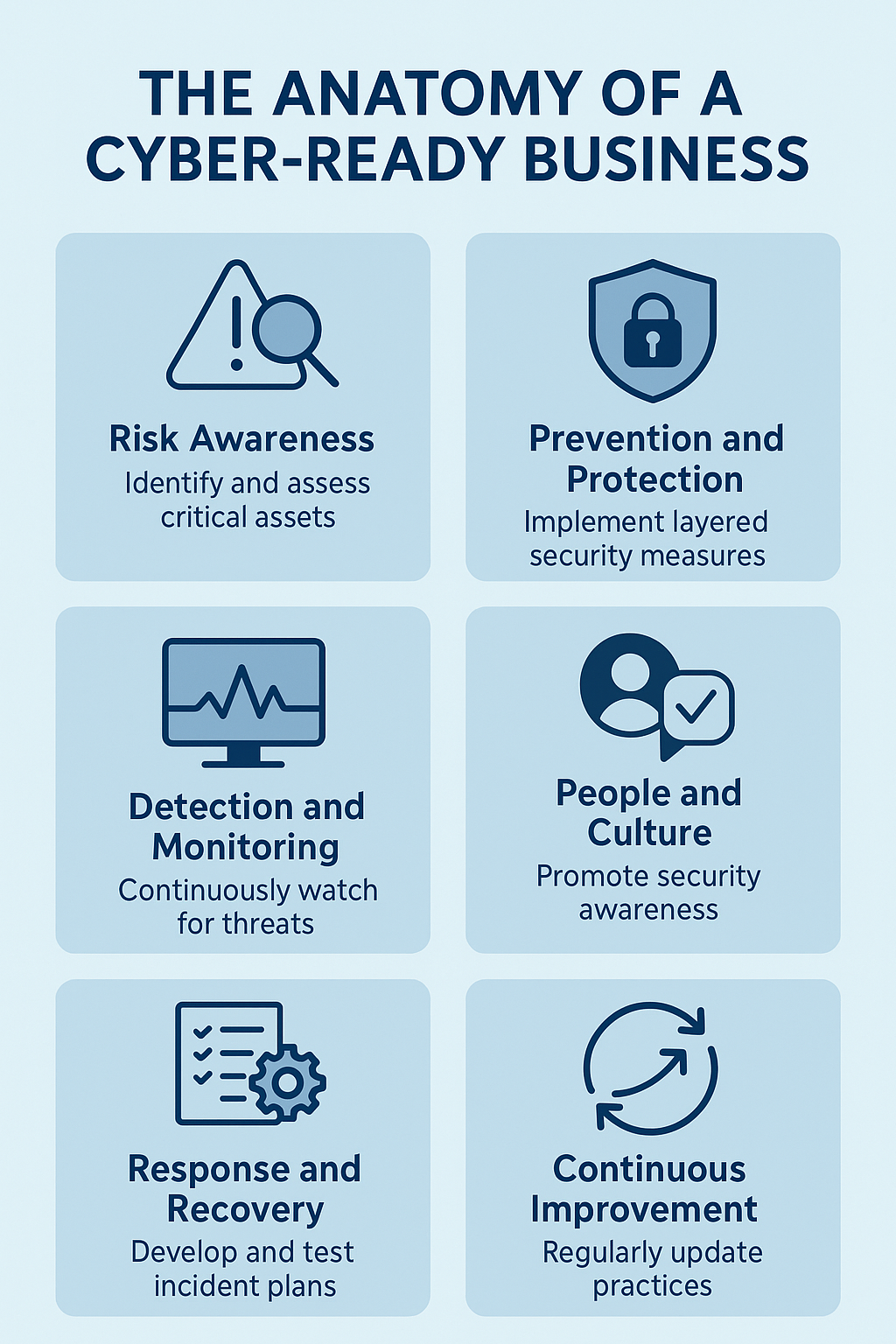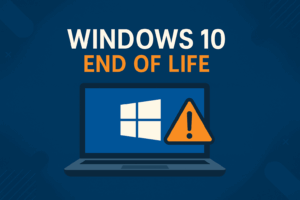Essential Cybersecurity Foundations for SMBs
Cyberattacks are rising across every industry, and small to mid-sized businesses are now prime targets. Whether you operate a startup, a growing company or an established organization, digital risks such as ransomware, phishing and data breaches can disrupt operations and damage customer trust. The good news: building a cyber-ready business doesn’t require a massive budget—just the right priorities and consistent action.
Taking proactive steps today minimizes surprises tomorrow. Strong cybersecurity isn’t luck—it’s preparation, awareness and smart execution.
What Makes a Business Cyber-Ready?
A cyber-ready business focuses on strengthening the areas that matter most. These building blocks work together to protect your data, reduce downtime and keep your team productive and secure.
1. Risk Awareness: Understanding Your Most Valuable Assets
Every cybersecurity strategy starts with knowing what you need to protect. Identify your critical data, systems, accounts and workflows. Assess what would happen if those assets were compromised or unavailable. Regular risk assessments help you stay ahead of new vulnerabilities and threats.
- Identify sensitive data (financial, operational, customer)
- Map out essential systems and access levels
- Document risks such as downtime, data loss or regulatory impact
With a clear view of your risk landscape, your cybersecurity investments become targeted and effective.
2. Prevention and Protection: Strengthening Your First Line of Defense
Cybersecurity is built on layers—no single tool prevents every threat. A strong foundation includes:
- Regular software and hardware updates
- Reliable antivirus and endpoint protection
- Multi-factor authentication (MFA) for sensitive systems
- Role-based access control for employees
- Secure password policies and password managers
When only trusted individuals have access to key systems and data, attackers have fewer openings to exploit.
3. People and Culture: Empowering Employees to Recognize Threats
Most cyber incidents begin with human error—phishing links, weak passwords or accidental data exposure. Building a security-aware culture dramatically reduces risk.
Practical steps include:
- Short, frequent cybersecurity awareness training
- Regular phishing simulation tests
- Clear reporting channels for suspicious activity
- Security reminders incorporated into daily workflows
When your team becomes your first line of defense, threats get stopped faster.
4. Detection and Monitoring: Identifying Threats in Real Time
Even with strong preventive controls, some threats will slip through. That’s why continuous monitoring is essential. Early detection limits damage, reduces downtime and speeds up recovery.
Many businesses define what “normal behavior” looks like—logins, activity patterns, device usage—so anomalies stand out instantly.
5. Response and Recovery: Preparing for the Unexpected
No cybersecurity plan is complete without an incident response strategy. When an incident happens, every minute counts. Clear, rehearsed procedures ensure your team reacts quickly and confidently.
Include:
- Documented incident response plan
- Emergency communication lists
- Steps for containing and isolating threats
- A plan for restoring systems and data
Regular and automated backups provide an essential safety net. With reliable recovery tools in place, your business can get back online quickly even after a major event.
6. Continuous Improvement: Staying Ahead of Evolving Threats
Cyberthreats change constantly. Reviewing policies, updating training and adjusting controls keeps your business resilient. After any incident or near-miss, evaluate what happened and strengthen your defenses accordingly.
Continuous improvement helps your organization maintain long-term stability, security and operational confidence.
Why Cyber Readiness Matters More Than Ever
Customers, partners and regulators expect businesses to protect data and maintain uptime. Strengthening your cybersecurity posture builds trust and positions your business as a reliable, forward-thinking organization.
Investing in these foundational pillars today helps ensure smoother operations tomorrow.
Need Help Strengthening Your Cybersecurity? We’re Here to Support You.
Cyber readiness isn’t just a checklist—it’s a long-term strategy. If managing all the pieces feels overwhelming, partnering with an experienced IT service provider can make the process smoother, faster and more effective.
Contact us for a no-obligation cybersecurity consultation. We’ll evaluate your environment, identify risks, and provide practical recommendations tailored to your business goals—so you can focus on growth, innovation, and peace of mind.










